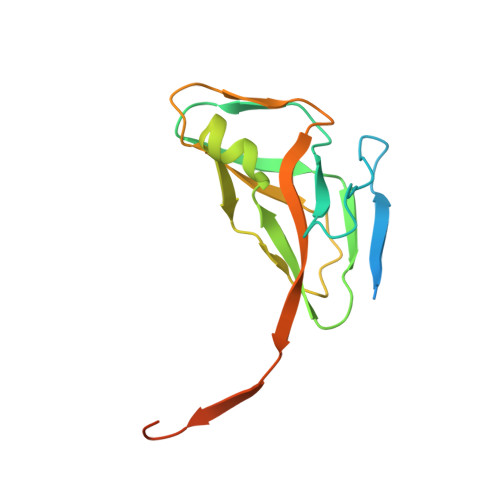Synthesis and discovery of N-carbonylpyrrolidine- or N-sulfonylpyrrolidine-containing uracil derivatives as potent human deoxyuridine triphosphatase inhibitors
Miyakoshi, H., Miyahara, S., Yokogawa, T., Chong, K.T., Taguchi, J., Endoh, K., Yano, W., Wakasa, T., Ueno, H., Takao, Y., Nomura, M., Shuto, S., Nagasawa, H., Fukuoka, M.(2012) J Med Chem 55: 2960-2969
- PubMed: 22404301
- DOI: https://doi.org/10.1021/jm201627n
- Primary Citation of Related Structures:
3ARA - PubMed Abstract:
Recently, deoxyuridine triphosphatase (dUTPase) has emerged as a potential target for drug development as part of a new strategy of 5-fluorouracil-based combination chemotherapy. We have initiated a program to develop potent drug-like dUTPase inhibitors based on structure-activity relationship (SAR) studies of uracil derivatives. N-Carbonylpyrrolidine- and N-sulfonylpyrrolidine-containing uracils were found to be promising scaffolds that led us to human dUTPase inhibitors (12k) having excellent potencies (IC(50) = 0.15 μM). The X-ray structure of a complex of 16a and human dUTPase revealed a unique binding mode wherein its uracil ring and phenyl ring occupy a uracil recognition region and a hydrophobic region, respectively, and are stacked on each other. Compounds 12a and 16a markedly enhanced the growth inhibition activity of 5-fluoro-2'-deoxyuridine against HeLa S3 cells in vitro (EC(50) = 0.27-0.30 μM), suggesting that our novel dUTPase inhibitors could contribute to the development of chemotherapeutic strategies when used in combination with TS inhibitors.
Organizational Affiliation:
Drug Discovery Research Center, Taiho Pharmaceutical Co. Ltd., Okubo 3, Tsukuba, Ibaraki 300-2611, Japan.
















